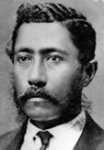crazyme
Banned
- Joined
- May 24, 2018
- Messages
- 687
- Reaction score
- 14
- Gender
- Undisclosed
- Political Leaning
- Undisclosed
Break the Mother 'Fuco-ing', the 'Mother' falsifying, the 'Mother falsifying' embellishing, the 'Mother falsifying-embellishing' concealing, ties and begin proper vetting for entry...
https://encrypted-tbn0.gstatic.com/images?q=tbn:ANd9GcQEkNK-hzoqNeW9d33dw4zyFhaY2_FlEHdz2Ni9ujwKU3w5rE6R2g
https://target.scene7.com/is/image/Target/GUEST_91560ae5-fb8f-42a6-96fe-344790765a7c?wid=488&hei=488&fmt=pjpeg
Kamehameha I; (c. 1736? – May 8 or 14, 1819[1] ), also known as Kamehameha the Great (full Hawaiian name: Kalani Paiʻea Wohi o Kaleikini Kealiʻikui Kamehameha o ʻIolani i Kaiwikapu kauʻi Ka Liholiho Kūnuiākea), was the founder and first ruler of the Kingdom of Hawaii. A statue of him was given to the National Statuary Hall Collection in Washington, D.C. by the state of Hawaii as one of two statues it is entitled to give.
https://en.wikipedia.org/wiki/Kamehameha_I
KA-MEHA-MEHA is the chief name around which Hawaiian history gathers. It is the nimbus of a cloud of stories, legends and chants. Hawaiians never reckoned history by dates, but by genealogies- They measured time not by the years but by the lives of men; not by the days passed, but by the deeds done. These genealogies formed the most essential part of Hawaiian literature. They proved the royal descent of the high chiefs.
When Ka-meha-meha became king of "The Rainbow Islands," his royal chant took the supreme place. Other genealogies lost their importance except as they blended in that of the great king. He traced his royal blood to Pili, "from a foreign land," and through Pili back to Wa-kea, a Polynesian chief of perhaps the second century; and thence back through a series of hero-gods to Kumu-Honua, "the first created." It is a remarkable genealogy and worthy of study.
Hawaiian Historical Legends: VII. Paao From Samoa
In November, 1736, he was born in North Kohala, Hawaii. Pili had settled in North Kohala.






